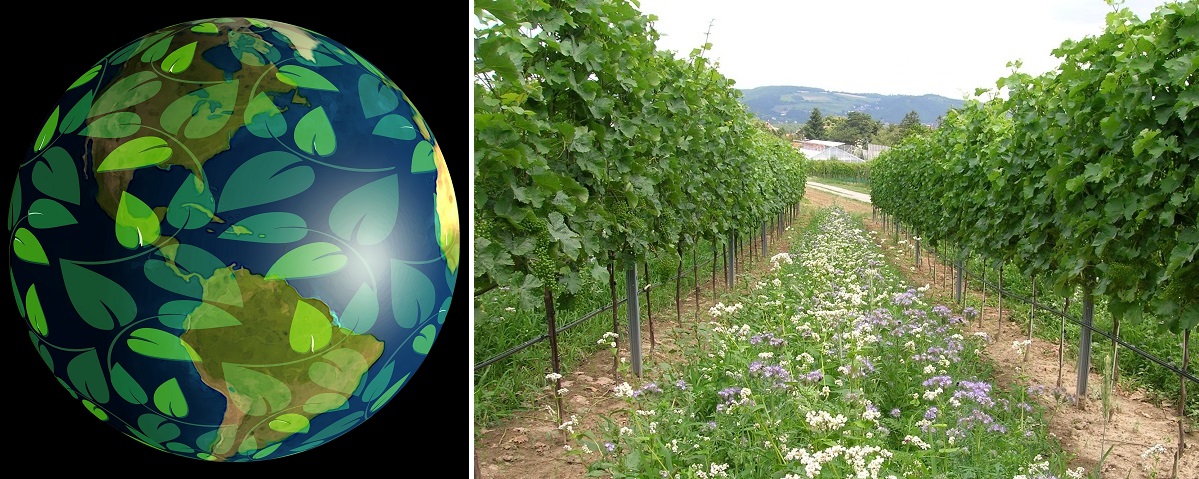Form of production for the cultivation of vineyards and wine making. There are also the terms organic viticulture, organic-biological viticulture, ecological-biological viticulture or (mostly common) biological viticulture; see there.
Organic viticulture
Organic, ecological or also organic-ecological viticulture refers to different forms of production for the production of grapes and wine based on the most nature-friendly measures possible, taking into account knowledge regarding ecology and environmental protection. In 2021, the OIV (Organisation Internationale de la Vigne et du Vin) published figures on the development of organic/ecologically certified viticulture. This increased by around 13% per year between 2005 and 2019.
The cultivated vineyard area worldwide is around 450,000 hectares, which corresponds to around 6% of the total area. European countries such as Italy and Austria dominate with 15%, France with 14% and Germany with 8%. Spain, France and Italy together account for 75% of the world's organically farmed vineyards.
Conversion to organic farming
When reorganising the management of vineyards, such as converting to organic methods, appropriate measures should be considered. The planned development of a vineyard or the planting of vines in compliance with all laws, observance of all criteria and the necessary measures are described in detail under vine development plan.
Conventional agrochemistry
Until the 1950s, it was common practice worldwide to use chemical agents on a massive scale against pests because little was known about the negative effects. Climate change also contributes to negative developments. Since the 1980s, conventional agrochemicals with their extensive use of synthetic fertilisers and pesticides to combat pests such as insects, weeds and microorganisms have come under increasing criticism and are seen as incompatible with sustainability and organic farming. However, a radical rejection of these practices is hardly realistic in the short term due to crop failures. The targeted and well-dosed use of modern agrochemicals can help to combat crop failures and thus world hunger.

Definitions of terms
There are many similar terms such as organic, ecological, controlled organic, controlled organic, organic farming/viticulture, organic farming/viticulture, organic-organic, biodynamic and bioenergetic. However, there is no substantive or legal difference between "organic" and "ecological"; the two terms are used interchangeably. Both are protected in connection with food and animal feed as well as agricultural raw materials that are produced and processed according to the guidelines of organic farming. All derivations and diminutive forms such as "Bio-" and "Öko-", alone or in combination, can occur.
From the consumer's point of view, great caution should be exercised with the labelling "from controlled contract farming", "extensive", "integrated farming", "controlled", "near-natural", "environmentally friendly" or "untreated" or similar formulations. These terms do not necessarily indicate production or processing in the sense of organic farming. To clarify or differentiate, here is a brief definition of the terms:
organic
Biology (bios = life) is the science of living beings as a branch of the natural sciences that deals with general laws, special features, organisation and development as well as structures and processes.
Ecological
Ecology (oikos = house, study of the household) is a sub-discipline of biology that investigates the relationships between living organisms and their inanimate environment. The term has become synonymous with "environment" or "environmental protection". A casual comparison between biological and ecological is: biological means that no chemicals have been used, and ecological means that the environment has also been protected/promoted.
organic
Pertaining to an organ or organism, belonging to living nature; forming a (harmonious) unit with something. This means that this sensitive relationship is taken into account during cultivation.
biodynamic
The term first appeared in the dictionary in 1980. It is mainly used in biodynamic viticulture and means "using only organic fertilisers, treated or fertilised only with such products (natural products)". There are also techniques that are not uncontroversial, such as taking into account the phases of the moon or planetary constellations.
Bioenergetic
Bioenergetics (bios = life, energeia = effectiveness) is a branch of biology, biophysics and biochemistry that deals with energy transformations in organisms. The term is used in bioenergetic viticulture. There are also not uncontroversial techniques such as music in winemaking.
integrated
In the context of certain processes, means the integration of individual measures such as integrated pest management (IPM/IP). In other words, it is a package of measures tailored to a specific purpose.
monitored
Compliance with the guidelines is regularly monitored by the responsible state-licensed and/or private institutions or associations.
Other terms
In addition, the terms "environmentally friendly", "environmentally conscious", "nature-orientated" or "sustainable viticulture" are...
Voices of our members

I have great respect for the scope and quality of the wein.plus encyclopaedia. It is a unique place to go for crisp, sound information on terms from the world of wine.
Dr. Edgar Müller
Dozent, Önologe und Weinbauberater, Bad Kreuznach